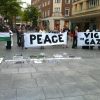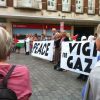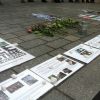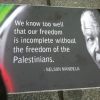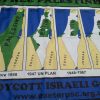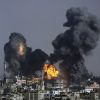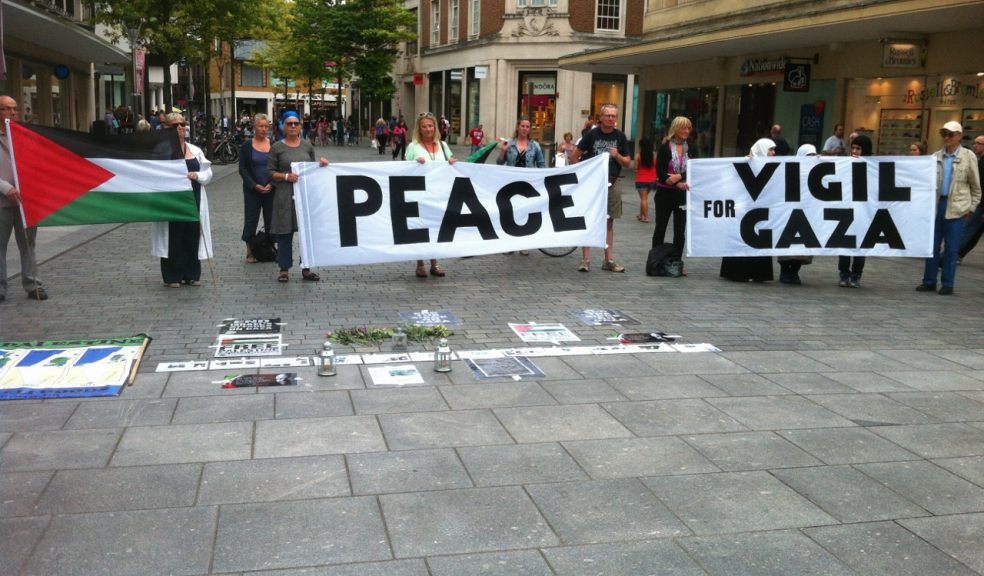
Gaza: the conflict and the protests explained
If you’re confused about the Gaza conflict, or have wondered about the protests staged in Exeter, Benjamin Howe summarizes events and interviews the protest group to explain.
With the continuation of the destructive conflict in Israel and the Gaza strip, The Exeter Palestine Solidarity Campaign (EPSC) has been protesting the actions of Israel in Exeter this week, with more rallies around Devon. On Saturday (9th August), a fully loaded bus of EPSC members left Exeter to take the protests to London.
Silent vigils have been held in Bedford Square along with protest rallies in Exeter High Street, calling for condemnation of Israel’s bombardments on Gaza, one of the most densely populated places on earth, with 6000 people per square km.
The issues in the conflict are not one sided, however, the casualties are overwhelmingly Palestinian, and civilian. The UN Organisation for the Coordination of Humanitarian Affairs says that as of the end of July, 789 Palestinians -578 civilians and 119 militants – and 37 Israelis have died. The vast majority of Palestinian casualties have been civilian, whereas most of Israel’s have been military.
Certainly, Israel is in control of the situation, and has been criticised internationally for exacting this toll, which in some cases has been argued to be deliberate, on innocent Palestinians. Over 250 people joined the protests in Exeter, where messages from Palestinian refugees were read out, and vigils were held for the mounting toll of children who have been killed in the conflict.
Exeter MP Ben Bradshaw, who joined a protest, said: “The Israeli attack constitutes a collective punishment of the Palestinian people which is illegal under international law."
The conflict is often seen to be discouragingly confusing, so here is a summary of the major events that have led to the violence in Gaza.
Although dispute over the land, which contains Jerusalem, has gone on for centuries, the modern conflict emerged in the aftermath of British control of Palestine in the 1940’s. After the Second World War, a plan was implemented by the UN to create a Jewish state - what became Israel - on Palestinian land, perceived to be historically ‘Jewish’. Jews had suffered immeasurably in the war and the holocaust, and it was determined they should have a homeland of their own. However, housing one population on the land of another only displaced the Palestinians living there.
By 1947, the U.N. divided the area roughly in two, with Palestinians in the Gaza Strip, and a large area known as the ‘West Bank’, and the Jewish state on the rest of the land. The Palestinian leaders, losing half their land, rejected the plan and uprisings ensued.
In 1948, the Jewish community declared itself independent and Israel was formed, prompting neighbouring Arab states to attack, leading to a war which Israel won. In the victory, Israel took control of 77% of the country’s territory, shrinking Gaza and the West Bank.
Relationships between Israel, and the neighbouring countries of Jordan, Syria, and Egypt, and Palestinians continued to decline to the point where today, Israel tightly controls the Gaza strip, and has begun building Israeli settlements on the West bank, which is forbidden in international law. In 2006, a group called Hamas took control of the Gaza strip. Although they were voted in, they are not internationally recognised because they call for the destruction of Israel, rejecting compromise. Their regime has at times been oppressive and violent, and in 2006 they took total control of the Gaza strip, violently ejecting the other main party, Fatah.
Hamas now acts with open aggression to Israel, firing rockets and digging tunnels to attack, and Israel responds to violence with violence. However, Israel’s overwhelming superiority in financial and military power, means that many, many more Gazans die in the fighting, most of them innocent civilians. Many people are apt to point out that Hamas’ violence is a product of the Israeli’s treatment of Palestine and Gaza, the latter of which is described as an ‘open prison’, with closed borders, and no option to leave by land, sea, or air.
In an interview with the Exeter Daily, protest Leader Tony Davies explains what the Exeter protests were about.
“The aim is to bring peace to Gaza.” Davies said, explaining that the power lies with Israel. “How it comes about is not necessarily our problem, but we need to facilitate peace by encouraging our MEP’s to exert as much pressure as possible. If they won’t listen, a boycott [international sanctions, consumer product boycotts, cessation of international aid] is essential.
“It’s a great shame Hamas won’t accept international peace forces keeping Gaza military-free. It would ensure that Hamas couldn’t fire rockets, and that Israel couldn’t abuse Gazans.”
“The only way [peace] will come about is by pressure from outside, particularly America. Without America’s $3.5 billion in aid, mainly in armaments, Israel couldn’t do what it is. America hasn’t been an honest broker. You can’t be an honest broker when you support one side.”
Davies is particularly concerned on the motivation of support for Israel, which he sees as ‘Zionism’, the nationalist movement of Jews that supports creation of a Jewish homeland. He also sees Zionists as having controlling interests in supporting countries, particularly the US, and the UK, citing it as one reason Israel receives so much support.
With all this international politics, Exeter residents might wonder what they can do, or what the point of the vigils is. Davies explains: “It’s about what we can do, to learn, to focus. The main thing in a vigil is for the people there to think about what they can do: take an interest, read about it, hear what’s going on and judge from your own feelings about the justice of the situation, and whether things should be changed. If you think so, when there are petitions to our MP, join in with pressure that you agree with in encouraging him to press the government.
In Davies’ view, it is the “imprisonment of people in Gaza” that have created the violent situation that now exists, seeing political Zionism as having a “belligerent tone” that wants to force all the Palestinians off the land.
“The Israelis have got to try to say ‘we want to live together in this land’. They must give up the idea of it being just for the Jews, and give up the idea of trying to get rid of the Palestinians.” He speaks of how resistance to Israel is, on top of the land issues, because people are not allowed to leave Gaza, not able to fly out of their country, the ill not being able to receive treatment. “While these conditions last, you’re going to have angry young men who are going to fight back” he says.
Davies retains an admirable composure, considering the issues provoke so much anger on both sides. Indeed, Palestinian calls to note the rising toll of slain children, and entire families wiped out, are hard to ignore. He calls for people to use their own judgement:
“Even though we’re busy in our own lives, it’s important to take an interest, not say, ‘oh it’s 2,000 miles away, there’s nothing we can do’. Davies urges people in Devon and across the country not to ignore the issues, and if they decide it to be right, join the EPSC in urging for sanctions and boycotts on Israel.
It certainly seems that, although rightfully concerned about Hamas’ actions, it is Israel who holds the keys to peace, controlling military might, Gaza’s borders, and economic power. Israel is clearly nervous about Hamas' open hostility, but a vast, modern army, fighting a refugee population who have understandably become radicalized, has produced nothing but continued violence, and that is what the EPSC wants to see finished.
For more information on the EPSC, visit http://www.exeterpsc.org.uk/ to see upcoming events, vigils, and protests.









